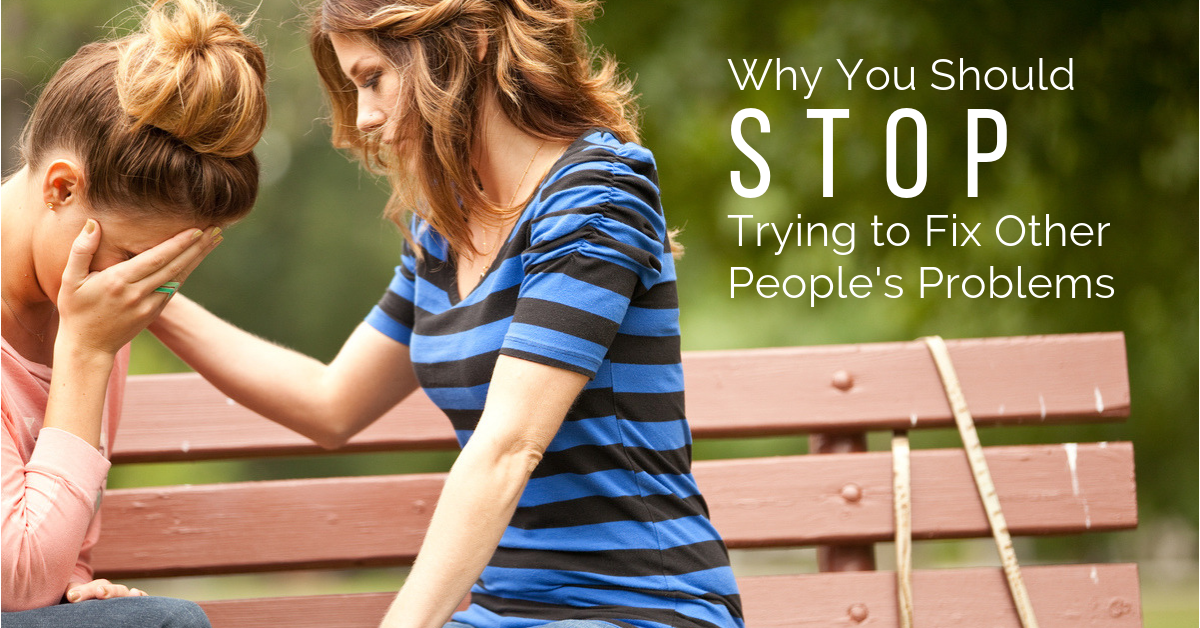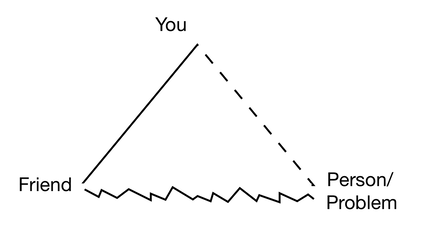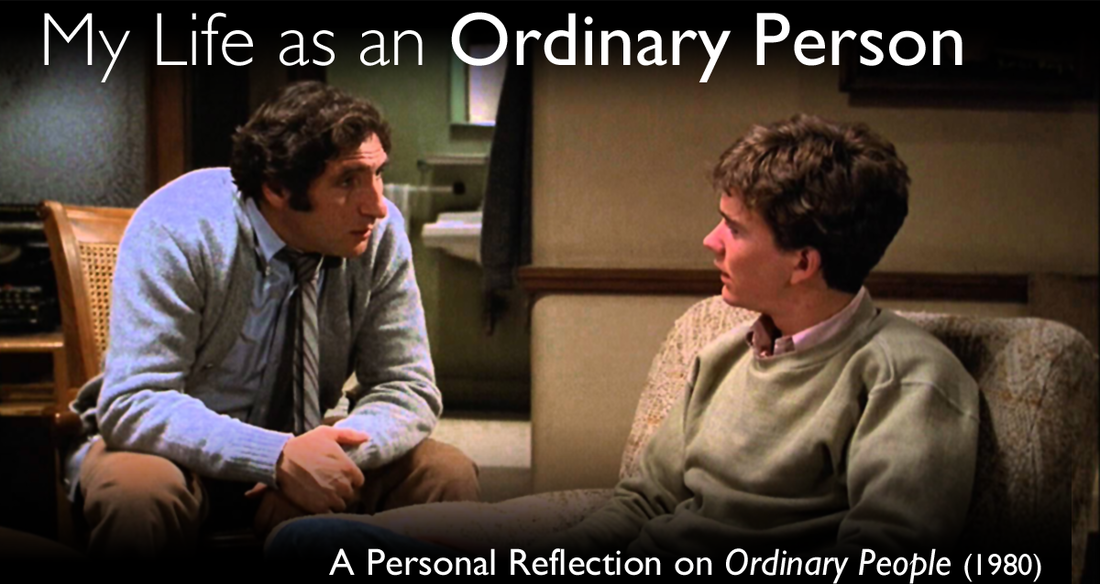|
by Rev. Tres Adames, MDiv, BCPC A friend you've known for years comes to you for help. They are desperate, emotional, and ask you to intervene. Maybe it's a problem with their partner, a habit they are trying to kick, or a struggle with anxiety or depression. You care about your friend, so of course you want to help. But before you jump in, it might be time to step on the brakes. There is nothing wrong with wanting to support your friend, but make sure you don't get in over your head. There is a difference between helping your friend versus taking on their problem. This is hard especially for empathetic people. We want to pitch in and help out. Yet it creates more problems if we don't approach it the right way. Aren't We Supposed to Help Others? Those I work with in counseling will point to the Bible, mentioning that we should help other people. This is true—we are supposed to care about others and help them, but only when they cannot help themselves. The Bible not only stresses the importance of helping others, but also emphasizes the importance of taking personal responsibility. According to the words of the Apostle Paul: Brothers and sisters, if someone is caught in a sin, you who live by the Spirit should restore that person gently. But watch yourselves, or you also may be tempted. Carry each other’s burdens, and in this way you will fulfill the law of Christ. If anyone thinks they are something when they are not, they deceive themselves. Each one should test their own actions. Then they can take pride in themselves alone, without comparing themselves to someone else, for each one should carry their own load" (Galatians 6:1-5, NIV). What is Paul saying here? He encourages the Galatians to "carry each others's burdens" but also that "each one should carry their own load." How is this possible? Aren't they the same thing? Not necessarily. In their book, Boundaries, Henry Cloud and John Townsend shed some light on the difference between a load and a burden: "The Greek word for burden means 'excess burdens,' or burdens that are so heavy that they weigh us down. These burdens are like boulders. They can crush us. We shouldn’t be expected to carry a boulder by ourselves! It would break our backs. We need help with the boulders — those times of crisis and tragedy in our lives. In contrast, the Greek word for load means 'cargo,' or 'the burden of daily toil.' This word describes the everyday things we all need to do. These loads are like knapsacks. Knapsacks are possible to carry. We are expected to carry our own" (Cloud & Townsend, 2017). We can help and be supportive, but we are not called to fix other people's problems or take responsibility for them. Paul is emphasizing the need for love and personal responsibility. In order to learn how to do this, let's dive deeper and explore this from the world of family systems theory. Don't Get Triangled! One of the most impactful books on relationships in the field of pastoral counseling is Generation to Generation by Edwin Friedman. In the book, Friedman describes what is known as an emotional triangle. According to Friedman: “The basic law of emotional triangles is that when any two parts of a system [this could be a family, a work environment, or a circle of friends] become uncomfortable with one another, they will ‘triangle in’ or focus upon a third person, or issue, as a way of stabilizing their own relationship with one another” (Friedman, 1985). Often, a third person is pulled into a triangle when two people in a relationship are in conflict with one another. To stabilize the relationship, another person is asked to help or may even be pulled into the situation by one or both people in the relationship. Sometimes the third person may intervene or “triangle” themselves into the unstable relationship out of desire to help. An example of an emotional triangle would be: 1) An adult man who is estranged from his adult brother 2) The brother 3) The parent who is asked to intervene or communicate on behalf of both. A part of an emotional triangle can also be a problem, such as an addictive habit or dysfunction. An example of a triangle involving a problem would be: 1) A person struggling with substance abuse 2) The substance abuse itself 3) An enabling partner. Let's take a look at this visually: Here you see the relationship between you and your friend indicated by a straight line. Your friend's struggling relationship with the other person (or problem) is represented by a jagged line. Notice that a broken line connects the third side of the triangle. Why? This is to indicate that there typically exists no control or real influence between you and the other person's relationship or problem. When any relationship is stuck, it is likely because a third person or issue has been interjected into the relationship. If you are the third wheel being introduced, the fact of the matter is that you have very little control over the outcome. If you try to fix the problem, you will only absorb the anxiety and stress from the whole situation. Sometimes, interfering can even produce the opposite effect. Attempting to reconcile two sparring partners may make them more distant or hostile. So what's the takeaway? Don't get triangled! Don't allow yourself to be put in the middle of the situation. So how can you help your friend who comes to you for support? Let's talk about a few healthy and more effective ways to influence change. 5 Effective Ways to be Supportive 1. Improve your relationship with both sides--Friedman notes that “We can only change the relationship to which we belong. Therefore, the way to bring change to the relationship of two others (and no one said it is easy) is to try to maintain a well-defined relationship with each, and to avoid the responsibility for their relationship with one another” (Friedman, 1985). Seek to be mature and get along with both sides. This might mean giving the benefit of the doubt to both persons in a conflicted relationship. If it concerns a friend struggling with addiction, work on your relationship with your friend and also work on your relationship with addiction itself—that is, learn more about addiction and how it works so you are more educated on how to respond. 2. Focus on the person, not the problem—Rather than getting caught up in solving the problem, encourage your friend's ability to take responsibility for it on their own. When the conversation drifts toward venting about the other person or problem, bring the focus of the discussion back to your friend. Ask how they are feeling and what's going on inside. 3. Ask questions, don't give answers—If your friend is insistent on talking about the problem, don't offer any solutions. Simply ask questions about how they plan to tackle the issue. This encourages them to strategize on their own rather than depending on you to solve their problem. 4. Be kind, but firm—Set boundaries with your friend as needed. If they keep calling or texting you, let them gently know that you aren't always available. Suggest other sources of support. Consider referring them to a local Christian counselor who specializes in the issue they are facing. 5. Remain self differentiated—Take care of yourself and acknowledge that this is not your problem—thankfully! Remain grounded, present, and non-anxious while still remaining connected as appropriate. Encourage them to seek God for wisdom. Offer to pray for them instead of being the only one they vent to. Besides, God wants us to talk to Him. May this be the situation that draws them closer to Him. Works Cited
by Tres Adames, M.Div. I counsel a lot of teenagers. Being in my thirties, I’m closer in age than most parents of teens. Even though we were all teenagers at one time, it’s easy to forget the difficulties of adolescence. Some blame the changing times. Others blame hormones. While these might be factors to an extent, research shows that brain development is likely a greater cause than we originally thought before. They’re not done growing. Several years ago, Frontline produced a documentary for PBS which presents how scientists are learning more about why teenagers act the way they do. According to research, the final part of brain development is not done until a person reaches the age of 25. This final phase is the formation of the prefrontal cortex, which orchestrates complex rational thought and decision-making. In other words, your teen may be six feet tall, but his brain isn’t done growing. A recent article in the New York Times notes that it’s the amygdala that develops first—the part of the brain that activates fear. This explains why teens feel a lot more anxiety than adults, and even feel more fear than children. How do teens deal with this uptick in fear? Many times by medicating emotions through addictive substances and behavior. Why teens do risky things. When adults come to me for help in overcoming addiction, I always ask them when they first started their behavior. Almost always it’s when they were in their teens or early twenties. The thing that some teens may not realize is that life is meant to get easier emotionally as they get older. A lot of adolescents I’ve talked to believe that the stress of life will only increase the older they get. I inform them that while responsibilities increase, access to the emotional resources and maturity they’ll need will also increase. This can be comforting words for any teenager to hear, especially if they are stressed over the future. "I have this theory that your body goes through puberty in its teens, and the mind goes through puberty in your twenties." --Zach Braff, actor and director How to relate better with your teen. So how can you help your teen when they are stressing out? Talk with them when they need it. Listen. Give them space. Sound like three contradictory approaches? I’ll explain. I use a humorous but helpful analogy when explaining teenage behavior to parents. Teens are not like dogs (eager to please you and following every directive). Teens are more like cats—and not just because they sleep all the time! Cats, like teens, are highly individual creatures. Give them too much attention and they’ll desperately try to get away. Leave them alone and they’ll come around. In fact, they may plop right on your keyboard while you’re trying to work. So back to the three approaches. How to help your teen: 1. Talk with them. Citing the research above, remember that teens have a harder time dealing with anxiety and fear. They also can’t reason as well as adults. When dealing with difficult problems, teens need help catching their emotions up with the rationale behind events in their lives. This is where the next step comes in. 2. Listen. Validate feelings but remain firm. When talking things through with your teen, give them the opportunity to express their viewpoint, even if you know it’s irrational. Many times, they just want to feel heard. You don’t have to give in, but let them express what’s on their mind (insofar as it is appropriate). Parents are quick to remember the Apostle Paul's words: "Children, obey your parents in the Lord, for this is right. 'Honor your father and mother''" (Ephesians 6:1-2) But Paul also adds this caveat: "Fathers, do not exasperate your children; instead, bring them up in the training and instruction of the Lord" (Ephesians 6:4). Kids don't respond well when they feel frustrated. Seek to listen, but still guide. Be firm, but seek to understand. 3. Give them space. Sometimes teens won’t open up. Let them have alone time, and if something is on their mind, make it known that you are willing to talk if they need you. Asking how their day went as soon as they walk in usually won’t elicit a response. Not asking at all and letting them come to you later may actually cause them to open up more. Also, encourage their individuality but don’t shield them from failure. If they lose a basketball game, don’t pull them out of the program. Let them feel the natural consequences of failure so they can learn how to really succeed. Note: This article is meant to only give some brief perspective on relating better with your teen. It’s much too short to cover all the bases, especially if you have a teen that is struggling significantly either personally or with others. Here are some books that go more in detail:
Finally, just remember that adolescents are trying to figure out how to be adults but can still be needy. Many actually do want to open up more and even please their parents—though they may never admit it. Don’t be afraid to let them grow up. Let these years be the foundation of a friendship that will last for years when they finally become adults. Subscribe to My Newsletter
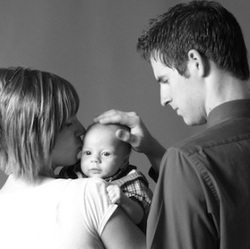 Your First Impression of God Growing up, your parents are the first impression you have of God. Because they provide for you, nurture you and discipline you, they are very ‘god-like’ to a young child. In fact, it is God who highlights this correlation in scripture and even presents Himself to us as Father. He desires a close, intimate relationship with us. One where we can call him “Abba” or roughly translated, “Daddy.” (Galatians 4:6) Worshipping God by Forgiving Your Parents. Unfortunately, we’ve all had earthly fathers that are less than perfect, and those negative qualities mistakenly get applied to God as we grow up. Yet God still presents Himself to us as Father. The process of growing up spiritually and emotionally requires you recognizing that your heavenly Father is more than your earthy father. This involves recognizing God as God, and as an adult, seeing your parents as ordinary people—people with flaws, just like you. Forgiveness is much easier when you recognize that people are human and have limitations. Boys into Men and Girls into Women. Much of your growth depends on how you were fathered. How does a child become an adult? He or she has to be fathered. If you had a father who was absent, distant or abusive (physically or emotionally), it takes the healing relational presence of God to take you through the developmental stages you still need in order to become a godly man or woman. The seed of maturity is already in you, it has to be affirmed, formed and guided. Allow God to transform and mature you. He is in fact, the perfect Father. Subscribe to My Newsletter 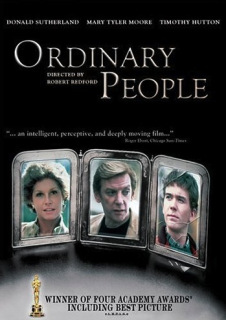 It was this film that influenced me to become a counselor. This post is one most personal pieces I've published publicly and details many of the things I've dealt with in my own life. I highly recommend this film to anyone who’s experienced deep loss. When I was in seminary several years ago, I was going to therapy. During one of our sessions, my counselor recommended a movie I had never heard of before. I wrote the title down and actually forgot about it for a couple months. One random day its title, Ordinary People flashed back into my memory. I decided to look for it on Netflix and watched it all the way through. The movie was dated, yet intense and unlike any film I had ever seen. Although the circumstances in the story were not exactly like those in own life, the emotions of the characters struck me right to the core. I’ve seen the movie over fifty times since then and no other film I’ve come across has touched me as deeply as this one. The story is set in Lake Forest, Illinois—an affluent neighborhood outside of Chicago. The Jarretts are a well-to do family who suffer a tragedy when their oldest son drowns in a boating accident. The family tries their best to move on and the story focuses primarily on Conrad, the younger son, as he tries to cope with the loss of his brother. Unable to bear the guilt, anger, and sorrow that accompany grief, Conrad makes a serious attempt on his life. He spends several months in a mental hospital and finally is allowed to return home. This is actually where the film begins and these preceding events are not revealed until later.  I relate so much with Conrad as he struggles with isolation, despair and the feeling of being misunderstood by almost everyone around him. His father is unable to connect with him and his mother tries repression, avoiding the issue altogether. What appears as an antagonist relationship between mother and son is actually a complex denial over the loss that affected both of them. My life has been marked by intense loss as I witnessed the unraveling and death of my own family—events that were beyond my control. As a result, I tried to grow up too quickly in order to move past the pain. In reality, it paralyzed a part of me—the part that is vulnerable and open with other people. In the movie, all is not left to desolation. Conrad agrees to see a therapist and begins to work on his anger and grief. With the support of his therapist and eventual girlfriend, Jeanine, Conrad is able to get in touch with his emotions and express his frustrations and hurt. His father is shaken by his son’s transformation and begins to break down as well. Beth, his mother, tries to remain steadfast in her repression. She keeps a stiff upper lip, regardless of the consequences and how it affects others. By the end of the film, Conrad has worked through the deepest of his most dark and intense emotions regarding the loss of his brother. He regains a sense of direction and hope for his life. His father also begins to see below the surface. He confronts his wife, who is unable to bear the burden of reality and decides to leave. It’s a sad ending that also holds a sense of hope, showing the transformation of two of the three family members.  In my life, it has taken many years to truly mature into adulthood. I’ve faced my own grief, self-hatred and despair, and in the darkest of trials have held strong to my faith in God. Ordinary People is not a Christian film. In fact, the main character is an atheist. But the depiction of its characters is so real and very authentic. This is not a movie made by Walt Disney. There is no gospel scene where the main character accepts Christ. We are instead treated to an honest, vivid portrayal of a family’s struggle to move on amidst tragedy, even if the process is painful. I figure that the film is named Ordinary People because it simply shows the hurt and pain that every human being goes through. It’s hard. It’s something we want to avoid—but it’s an inescapable factor of life that eventually brings greater healing, hope, and even joy. It is in my own journey that I’ve felt the presence of God in the most trying and dark circumstances. But that doesn’t make me extraordinary. I’m ordinary…an ordinary person…and that’s just fine with me. |
Article Topics
All
Archives
July 2023
|
We're ready to help. Let's begin.
Peoria LocationInside State Farm
9299 W Olive Ave Ste 212 Peoria AZ 85345 |
Phoenix LocationInside CrossRoads UMC
7901 N Central Ave Phoenix AZ 85020 |
About |
Services |
EducationPrograms
ACPE Spiritual Care Specialist Pastoral Counseling Apprenticeship Deconstruction Course Free Grief Training Contact |
We're ready to help. Let's begin.
© 2024 Prism Counseling & Coaching. All Rights Reserved.
Christian DISC® is a registered trademark of Prism Counseling & Coaching.
Christian DISC® is a registered trademark of Prism Counseling & Coaching.

